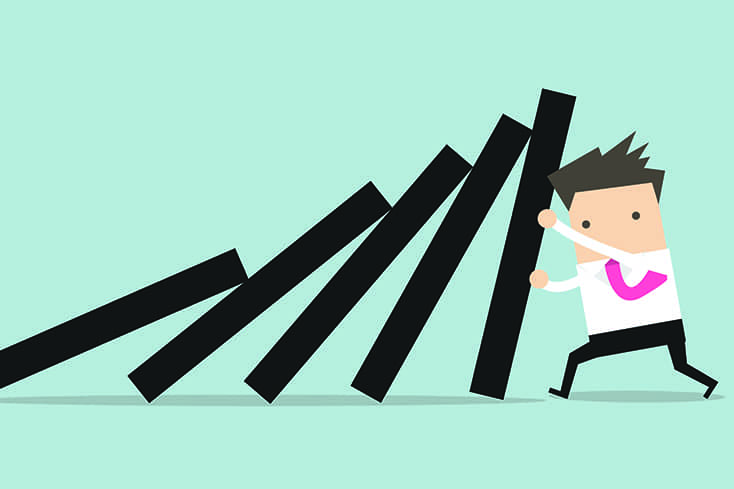May 19, 2021
By Pantea Vahidi, RN, Corporate Wellness Advisor

Having watched patients in their most vulnerable times of pain and agony, I have been privileged to witness many of them find the courage and strength to rise above their circumstances. I have noticed that resilient people have certain traits and a mindset that sets them apart.
As a young girl, I first started observing how my parents responded to crisis. I grew up during a war that took over our lives for close to a decade. I watched how my parents implemented safety measures and took in the worries, but held a straight face. Looking back at those years I now see a pattern. I see how resilient people share certain characteristics. These common traits leave clues and teach us proven effective approaches on how to bend, but not break in the face of adversity.
1) Resilient People Accept the Baseline: Baseline is your current situation. It is a term we use in the medical field to describe the usual health condition of patients. The baseline blood pressure of athletes is different than most. Their blood pressure may be alarming for someone who doesn’t regularly exercise, but it is normal for their body to function in complete balance. The concept of “baseline” also applies to our lives. Your normal may be different than someone else’s, but it’s yours to own. Resilient people do not ask “why me?”, they accept their baseline and put in the effort to change it if they are bothered by it.
2) Resilient People Are Flexible: Being willing to change plans and pivot is crucial to being resilient. Those who have experienced adversities know that often times life does not go as planned, and the frustration of refusing to change is an unnecessary source of depletion and burnout.
3) Resilient People are Willing to Learn: When challenges and change strike us, we need new skills and knowledge to cope with and overcome the adversities. Resilient people are open to learning about the topic that they are facing. They know that the more equipped they are with information and facts, the better they can make decisions and battle what they are facing.
4) Resilient People Seek Solutions: When life takes a turn, we can either sit and complain or immediately look for solutions. Resilient people are quick to look for ways to resolve or at least improve the situation. They do not expend their energy in reciting why the problem is difficult or unfair. They channel that time, mental, and emotional energy to find solutions.
5) Resilient People are Resourceful: Unusual circumstances call for unusual measures. Those who are resourceful make do with what is available and use their accessible resources to the best of their ability. Many can function and perform in ideal situations, but to be able to work with what is at their disposal is the difference between wishful thinking and being realistic and resilient.
6) Resilient People are Creative: When we face trials and turbulences, we often need to think outside the box to come up with new ways to overcome. Resilient people know that they need to tap into their creative thinking to adjust and adapt. They somehow know what Einstein knew that “We cannot solve our problems with the same thinking we used when we created them.”
7) Resilient People Set Realistic Expectations: Expectations are what we believe about the future. While not crossing the line of being pessimistic, resilient people know that by having unrealistic expectations, they are setting themselves up for a major disappointment, which will lead to frustration. Having realistic expectations is a mental rehearsal which makes us more prepared for what is to come.
While the pandemic brought a unique sense of uncertainty, for many people around the world, having to live day by day is not a new concept. We all need resilience tools to withstand the storms of life. Observing how resilient people handle adversities and taking a page out of their book is an effective method of learning skills to build much needed strength to weather the storms and bend but not break.
Pantea Vahidi, RN, is a Compassion and Resilience Advisor, Educator, Registered Nurse, Researcher and Engineer. Integrating her design and patient care experience, she has developed courses and trainings with practical tools to cultivate compassion and foster resilience to prevent and heal burnout. Vahidi teaches compassionate care and health equity classes at the University of California, San Diego. She advises hospitals and corporations on implementing resilience strategies. Vahidi is a member of the Compassion and Empathy research team at UCSD and is passionate about combining the art and science of medicine and compassion for ultimate healing. Pantea's mission is to Raise awareness, Inspire, Support, and Empower (RISE) with Compassion™
This piece originally appeared on thriveglobal.com on February 4, 2021.
Submit To The NAMI Blog
We’re always accepting submissions to the NAMI Blog! We feature the latest research, stories of recovery, ways to end stigma and strategies for living well with mental illness. Most importantly: We feature your voices.
LEARN MORE